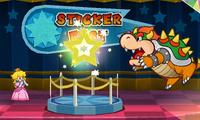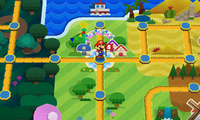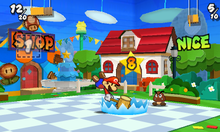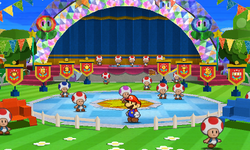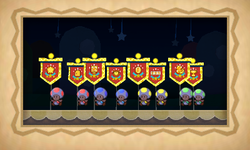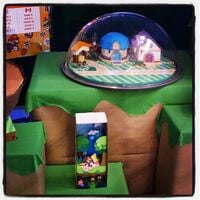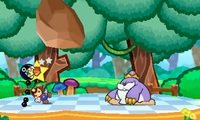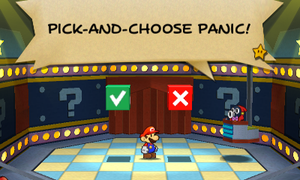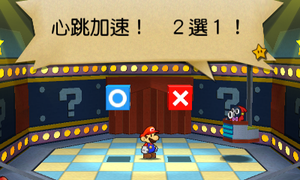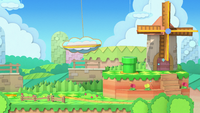Paper Mario: Sticker Star: Difference between revisions
Tag: Mobile edit |
|||
| Line 1,458: | Line 1,458: | ||
==Regional differences== | ==Regional differences== | ||
*The Korean and Chinese versions changed the color of the Paper Fan from red to blue and removed the kanji symbol. | |||
*The windmill code at Hither Thither Hill is 7942 in the Korean version, 9958 in the Chinese version, and 4123 in all other versions. | *The windmill code at Hither Thither Hill is 7942 in the Korean version, 9958 in the Chinese version, and 4123 in all other versions. | ||
*The European English, Spanish, and French script modifies some of the names of Things and the Sticky Wiki Entries in the Sticker Museum, such as the [[Paper Fan]] and [[Cell Phone]], known as the Mobile Phone in European English. In addition, the European release of the game adds descriptions for Things while they are a sticker in the album. | *The European English, Spanish, and French script modifies some of the names of Things and the Sticky Wiki Entries in the Sticker Museum, such as the [[Paper Fan]] and [[Cell Phone]], known as the Mobile Phone in European English. In addition, the European release of the game adds descriptions for Things while they are a sticker in the album. | ||
Revision as of 22:05, July 16, 2024
- "Sticker Star" redirects here. For Kersti's home in the game, see List of implied locations § Sticker Star.
| Paper Mario: Sticker Star | |||||||||||||||||
|---|---|---|---|---|---|---|---|---|---|---|---|---|---|---|---|---|---|
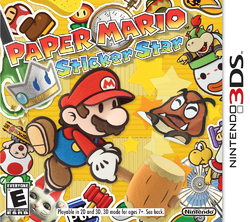 North American box art For alternate box art, see the game's gallery. | |||||||||||||||||
| Developer | Intelligent Systems Vanpool Nintendo SPD Group No.3 | ||||||||||||||||
| Publisher | Nintendo | ||||||||||||||||
| Platform(s) | Nintendo 3DS | ||||||||||||||||
| Release date | Original release Template:Release Nintendo Selects Template:Release | ||||||||||||||||
| Language(s) | English (United Kingdom) English (United States) French (France) French (Canada) German Spanish (Spain) Spanish (Latin America) Italian Japanese Simplified Chinese Traditional Chinese Korean | ||||||||||||||||
| Genre | Action-adventure, role-playing game | ||||||||||||||||
| Rating(s) |
| ||||||||||||||||
| Mode(s) | Single-player | ||||||||||||||||
| Format | Nintendo 3DS: | ||||||||||||||||
| Input | Nintendo 3DS:
| ||||||||||||||||
| Serial code(s) | CTR-AG5E-USA (U.S.) | ||||||||||||||||
Paper Mario: Sticker Star is an action-adventure, role-playing game developed by Intelligent Systems and released for the Nintendo 3DS as the fourth installment in the Paper Mario series, as well as the first installment released for a handheld console. It succeeded Super Paper Mario from 2007, and was itself succeeded by Paper Mario: Color Splash and Paper Mario: The Origami King in 2016 and 2020 respectively. This game follows Mario on his adventure to defeat Bowser and rescue Princess Peach after Bowser accidentally breaks the Sticker Comet and comes under the influence of the strongest Royal Sticker. Along the way, Mario and his partner Kersti must collect the Comet Pieces, fragments of the Sticker Comet, and all six Royal Stickers spread across six worlds.
The game returns to the general gameplay style of the first two Paper Mario games. Mario traverses through an overworld and battles enemies through turn-based combat. However, the game is segmented into levels and worlds rather than chapters and the game completely overhauls the battle system. Flower Points, Star Points, badges, permanent upgrades to Mario's boots and hammer, and party member abilities are removed in favor for single-use items in the form of stickers.
The visual presentation places a greater emphasis on the "paper" aspect than the previous games. Many characters actively refer to themselves as existing within a paper world, most notably Kersti. The world's environments also resemble craft materials like cardboard and appear similar to dioramas. Game mechanics like status effects complement the paper aesthetic. Along with the change in the art style, returning elements such as Goombas and Hammer Bros. have their designs changed to better resemble contemporary depictions. The game also scales back unique locations, instead using the general themes of locations seen in previous Super Mario games. The diversity of friendly characters and enemies has also been reduced, with most characters being standard Toads. A few enemies from Super Mario Bros. 2 appear, such as Shy Guys, Ninjis, and, making their Paper Mario series debut, Snifits. These changes to the gameplay, appearance, and characters would be the template for subsequent installments in the series.
Story
The story begins on the night of the Sticker Fest, where the citizens of Decalburg have gathered to witness the Sticker Comet, which is said to make everyone's wishes come true. While Princess Peach, Mario and the Toads celebrate the event, Bowser and his minions show up suddenly, planning to steal the Sticker Comet. Bowser touches the comet, causing it to break into six Royal Stickers, which are scattered throughout Decalburg and other worlds. One of them falls on Bowser's head, making him much more powerful. Mario tries to stop him, but is overpowered, and later wakes up to discover that the Sticker Fest is in ruins, and the princess is missing as well as several Toads. Shortly after, Mario meets Kersti, who accuses Mario of touching the Sticker Comet. Mario explains that it was Bowser who touched the comet and agrees to help her find the Royal Stickers. Kersti introduces herself as caretaker of the Royal Stickers, and becomes Mario's companion for his adventure.
Mario starts by finding and freeing the Toads hidden or taped down by Bowser, getting both a hammer and album in the process. After rescuing the Toads, Mario heads toward the plaza and discovers the area rolled up. The Toads push hard enough to unroll the town and return it to normal. As Mario leaves the town, he gets ambushed by a trio of Goombas. Kersti uses the opportunity to explain how to use stickers in battle, and Mario defeats the Goombas, allowing him to exit the plaza and explore nearby worlds.
World 1
Mario starts his travels in World 1, a land filled with grasslands and mountains. In W 1-1, Warm Fuzzy Plains, Mario and Kersti meet a group of Toads hunting for stickers, one of whom who runs into them and drops a special Scissors sticker. Bowser Jr. appears and demands they give him the sticker, but is defeated. Infuriated, he crumples up the bridge and throws the scrap up onto a high ledge Mario cannot reach. Mario and Kersti get help from the group of Toads, who form stairs for them, allowing them to reach the ledge. Kersti then teaches Mario how to paperize, allowing them to fix the bridge and progress. Before they can reach their first Comet Piece, they battle the trio of Goombas previously fought in Decalburg. After they are defeated a second time, they collect the Comet Piece.
In W 1-3, Water's Edge Way, the Toad from before runs into Mario a second time, having been chased again. He gives Mario an album page and flees, letting him deal with Kamek. After Kamek is defeated, he attempts to slow them down by using paperization to pull the Comet Piece out of place, then tossing it away. Mario and Kersti then search for the Comet Piece, then use their paperization skills to put the comet piece back in place, allowing them to collect it and complete the level.
Later on, in W 1-4, Hither Thither Hill, Mario leads a Green Toad back to Decalburg, who in return gives him a hint for the combination of four number blocks inside the windmill. This leads him underground, where he battles a Big Buzzy Beetle to get one of his first HP-Up Hearts. In W 1-5, Whammino Mountain, Mario can scale a mountain infested with Spinys where a Blue Toad must be rescued.
Finally, Mario and Kersti arrive at W 1-6, Goomba Fortress, where the first Royal Sticker is held. Mario travels through the fortress, dealing with puzzles and Bob-omb attacks along the way. Finally, he and Kersti reach the top of the fortress, where they confront a Goomba corrupted by the Royal Sticker and his minions, who battle them as the Megasparkle Goomba. Near the end of the battle, the Megasparkle Goomba splits up and the other Goombas abandon their leader, claiming that the Royal Sticker is destroying who they are. The angered Goomba attempts to battle on his own, but Mario is able to defeat him and collect the first Royal Sticker.
World 2
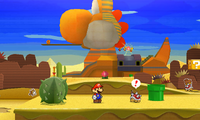
Mario and Kersti then use stickers to unlock a doorway leading to World 2, which has a desert theme. They first travel through W 2-1, Drybake Desert, where they scale a large pyramid and find a hidden treasure chest containing a mysterious tablet piece. Next, they explore the outside and inside of the Yoshi Sphinx, where they battle Kamek a second time. After he is defeated, he flees, allowing Mario to collect the second tablet piece.
Afterward, Mario and Kersti traverse through W 2-3, Sandshifter Ruins, an underground labyrinth with two Comet Pieces. A secret ending takes them to W 2-4, Damp Oasis, which is being destroyed due to a sandstorm. After stopping the sandstorm and filling up the oasis with water, they find their third and final tablet piece.
They use the recovered tablet pieces at W 2-5 to uncover Drybake Stadium, which Kamek had used his magic to fold up. After solving many puzzles and traveling to the top floor, Mario faces Tower Power Pokey, the guardian of the second Royal Sticker. By defeating him, Mario and Kersti recover the second Royal Sticker.
World 3
The next world is World 3, which is forest-themed. At the entrance of Leaflitter Path is a sleeping Wiggler, who gets awakened by Mario. He tells Mario that he was looking for food, due to the entire forest being polluted by poison. Mario and Kersti decide to help Wiggler and agree to follow him to his house. However, after venturing deeper in the forest, Wiggler is snatched by Poison Bloopers.
After going through a maze known as The Bafflewood in W 3-2, Mario and Kersti arrive at W 3-3, Wiggler's Tree House, where they discover that Wiggler has been broken into five segments by Kamek's magic, four of which run away to different parts of the forest. Mario and Kersti agree to find the segments and bring them back to Wiggler.
Mario and Kersti travel throughout the entire forest, where each Wiggler Segment are found, battled, and brought back to Wiggler. Various events happen along the way, such as Mario losing his entire inventory (including his Hammer and Kersti) in W 3-7, Rustle Burrow, and retrieving a Wiggler segment from a game show known as Snifit or Whiffit in W 3-10, Stump Glade.
In W 3-12, Whitecap Beach, the poison is discovered to be coming from a nearby island. Here, the last Wiggler Segment, after freeing it from Poison Bloopers, is enraged by this and runs to Surfshine Harbor to get a boat and reach the island. The Toad that owns the boat refuses because a fishing boat was recently lost at the island. After this, the Wiggler Segment decides to finally return home.
After Mario and Kersti reassemble Wiggler using their paperization ability, he decides that he has had enough and helps them by taking them to the island where the poison comes from. There, it is shown that Gooper Blooper, corrupted by the third Royal Sticker, is the cause of the poison in the forest. After defeating the Blooper, the poison disappears from the ocean and the forest, allowing Mario to obtain the third Royal Sticker. Afterward, the forest returns to its regular state, and Wiggler is able to eat leaves from the forest as a result.
Surfshine Harbor
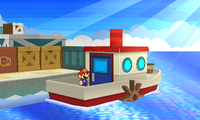
To reach the other worlds, Mario and Kersti require the boat from Surfshine Harbor. However, they first help the sailor Toad by cutting a rope attaching the boat to the dock, finding the ship's wheel in a dark storage room, and battling a Big Cheep Cheep. After it is defeated, the Toad retires from sailing, enabling Mario to use the boat as he wishes and cross the Decal Channel.
World 4
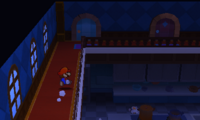
World 4 has a snow theme. As Mario and Kersti travel through it, they come across The Enigmansion, where its steward sits outside due to the mansion being haunted by Boos which have been freed from the Book of Sealing. He gives Mario the task of finding all 100 of them, sealing them back in the book, and placing it on the pedestal in the basement. After the task is completed, Kamek reveals himself, claiming that he released the Boos by accident when he was looking for a novel about stickers. He tears out the pages of the book, and crumples them together to form a Big Boo, and leaves, leaving Mario to fight him. After the Big Boo is defeated and sealed again in the book, the steward thanks Mario by inviting him to enjoy tea, as well as letting Mario have the Forebear's Portrait, a portrait of the Enigmansion's previous steward.
Mario and Kersti then head to W 4-5, Whiteout Valley, where they use the portrait to fill a hole. The forebear thanks Mario by starting up the ski lift, which Mario rides to reach W 4-5, Bowser's Snow Fort, a minecart roller coaster which Mario rides to reach the Bowser Snow Statue, which he battles to collect the fourth Royal Sticker. After breaking it down, it is revealed to be Mizzter Blizzard, a snowman who reveals that he only wanted a body that would not melt, and although the Royal Sticker gave him that, it also corrupted his mind. When Mizzter Blizzard is defeated and the fourth Royal Sticker can be obtained, his final request is for Mario to rebuild him next winter, so they can meet on more peaceful terms.
If the player returns to the Enigmansion, the forebear has returned, and the former steward is now a servant. Leaving the world also causes Bowser Jr. to intercept and fight Mario. By defeating him again, Bowser Jr. retreats once more, this time to his father's castle.
World 5
At World 5, which has a jungle theme, Mario and Kersti travel through a forested area where they restore a bridges whose pieces are taken by Spear Guys, ride a raft while avoiding dangerous obstacles, and get chased by a massive Cheep Chomp. This is followed by W 5-4, Chomp Ruins, where Mario battles a massive Chain Chomp after waking him up. Afterward, Mario and Kersti start their trek to the volcano itself, starting with W 5-5, Rugged Road.
At W 5-6, Rumble Volcano, Mario and Kersti fall into a pit, trapping them inside the volcano. Petey Piranha who is in possession of the fifth Royal Sticker, eats Kersti, rendering Mario unable to get advice or paperize. Mario uses Chain Chomps to balance out a platform, taking him to the level with Petey Piranha, where they begin to battle. During the battle, Kersti is spat up, and helps Mario for the rest of the battle by enabling him to use the Battle Spinner again. After his defeat, Petey Piranha disappears, leaving behind the fifth Royal Sticker.
World 6
As they arrive at Gate Cliff at World 6, the five Royal Stickers begin to react. As Mario places them on the wall, he paperizes and flips it, revealing Bowser's castle, which flies to the sky, out of Mario's reach. Upon hearing mention of a creature flying over the forest and by heading to Wiggler's house, they find out Wiggler has matured into Flutter. Wanting to repay Mario and Kersti for restoring the forest to its current condition, Wiggler flies the pair up to W 6-2, Bowser Jr.'s Flotilla. Here, Mario defeats Bowser Jr. for the final time, and is able to reach Bowser's Sky Castle.
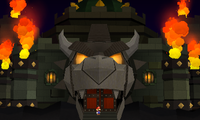
At the castle, Mario faces and defeats Kamek for the last time. With him out of the way, Mario continues on to Bowser at the final area of the castle, where Princess Peach is taped to a chain. During the final showdown, which is separated into five stages, Bowser performs events intending to slow Mario down, including summoning allies to fight alongside him, summoning a Whomp, and summoning a small Chain Chomp, retreating each time.
After the Chain Chomp is deflected back at Bowser, he falls down into a pit with the last Royal Sticker, and emerges seconds later as a much larger, stronger version of himself. With any attack dealing little damage to him, Kersti comes to the realization that something must be done. She sacrifices herself by turning into a sticker, which Mario uses to significantly boost his attacks. Before she disappears, Kersti apologizes for all the hassle she caused to him and says goodbye. With his increased power, Mario defeats Bowser, releasing him from the Royal Sticker's control. Mario then frees Peach and uses the Royal Stickers to wish for everything to return to normal. After Peach congratulates Mario and the rest of the kingdom for their success, Bowser attempts to steal the Sticker Comet once again, only for the revived Kersti to intervene. She jokes that she wants to change her career, and Mario, Peach, and Bowser laugh, ending the game.
Gameplay
Like Super Paper Mario, worlds are segmented into levels. However, navigation between levels is done so using a world map and levels have three-dimensional depth by default. They are completed by collecting a Comet Piece. By defeating enemies, additional bonus coins drop during the goal sequence. Some levels feature more than one Comet Piece. Collecting the alternative Comet Piece opens up a different path on the world map.
Players have to gather stickers, which are necessary both for solving puzzles and gaining battle commands. Stickers are a major part of the gameplay and storyline. Some real-world objects called Things appear which must be converted into stickers using a Sling-a-Thing location. Doing so allows them to be used in puzzles or battles. Instead of leveling up from experience points as in the previous installments, Mario must find HP-Up Hearts in levels, which each increase his current HP by 5 and increase attack power from First Strikes by one for every two HP-Up Hearts collected. Stickers replace Badges from the first two installments of the series.
In levels, Mario can use his hammer to interact with the environment and uncover collectables like coins and hearts. Mario's partner Kersti grants him the ability to paperize. While using this ability, Mario can paste stickers or scraps onto the environment. This allows him to solve puzzles and uncover secrets. Kersti can also give Mario her thoughts and hints by pressing .
Controls
|
World map
|
Field
|
Battle
|
Menu
|
Mario's stats
Items and objects
This section is under construction. Therefore, please excuse its informal appearance while it is being worked on. We hope to have it completed as soon as possible.
| Object | Effect |
|---|---|
Save Block |
When it is hit, the game's progress is saved. |
HP Block |
Heals Mario to full health when it is hit. It is usually found next to a Save Block. |
? Block |
Contains coins or stickers and releases them when it is hit. Once all of its goods are depleted, it turns into an Empty Block. |
| Hidden Block | Invisible ? Blocks which become visible after Mario hits them. |
Brick Block |
Usually does not contain anything and breaks away when it is hit. |
Warp Pipe |
Brings Mario to another area within a level quickly. |
Super Star |
A rare item that allows Mario to instantly defeat any enemy he touches. |
Coin |
Allows Mario to purchase stickers, Things, and activate the Battle Spinner. Coins come in three different sizes worth one, five, and ten coins. |
Heart |
Recovers five points of Mario's HP. |
HP-Up Heart |
Increases Mario's total HP by five and increases the power of First Strikes for every two HP-Up Hearts collected. |
| Airship | Bowser Jr.'s Flotilla takes place aboard a giant aircraft. |
| Bowser Tape | Sticky tape used to seal passageways or capture Toads. The player must hold |
| Cactus | Scenery found throughout World 2. If Mario hits a cactus with his hammer, it spins, blooms, and releases a coin. |
| Chairlift | Mario and Kersti ride a chairlift in Whiteout Valley to reach the Comet Piece. |
| Grinder | Buzzsaws found in Chomp Ruins. They harm Mario if he touches the blades, but he can stand on top of their mechanisms safely. |
| Ice Ball | Projectiles thrown by Ice Mario and Ice Bros, which freeze their target upon contact. |
| Junior Clown Car | Bowser Jr.'s vehicle. It can spit fireballs at Mario, and during Bowser Jr.'s final battle, he puts a shield over the Clown Car, making him nearly invincible. |
| Treasure chest | Rare chests that contain the three Tablet Pieces. |
Battle system
After forgoing the classic battle system in favor of a sidescrolling platformer-style system in Super Paper Mario, Paper Mario: Sticker Star returns to the turn-based system from the first two installments. Much like in both, the player has a hand in the battle's first move, where attacking an enemy on the field will result in them taking damage upon entering the fight, and getting attacked in the same way by an enemy will lead to Mario taking damage at the start of battle, an outcome that is also realized when jumping on a spiked foe. It is worth noting that getting hit by an enemy projectile on the field will not initiate a battle sequence.
Contrarily to the first two games, however, instead of the typical battle commands, stickers are used in their place. Stickers are consumed when selected for a command. If the battle ends before a sticker gets used, it still disappears from Mario's album. Kersti supplies Mario with stickers if he runs out of them in the album. Another new feature is the "Battle Spinner" slot machine. To activate it, the player must spend three coins. By matching symbols, the Battle Spinner can allow Mario to attack with multiple stickers in one turn, gain coins, or cause a different event to occur, depending on the combination received.
Enemies that assist other enemies before entering the battle do a unique animation:
- Goombas jump to their position.
- Koopa Troopas unfold themselves from their shell when they are at their position.
- Buzzy Beetles drop from above hiding in their shell.
- Spinies do the same thing as Buzzy Beetles except Spinies curl up into a ball when dropping.
- Bob-ombs drop from the top screen using Parachutes.
- Swoops fly down from the top screen.
- Sombrero Guys run into the battle at their position and throw their Sombreros up high.
- Dry Bones are crumpled at first.
- Paragoombas just act like Goombas.
- Pokeys rise from the ground.
- Shy Guys and Snifits run to their position. They may sometimes trip before reaching their position.
- Spikes run to their position and ground pound.
- Ninjis appear from a puff of smoke when the battle starts.
- Scuttlebugs jump around two times while hanging Scuttlebugs on webs make way down from the top screen.
In order to win the battle, Mario must reduce the enemy's HP to zero. His available options come from the stickers inside his album. If the player has the ability to use multiple stickers during a turn, they can begin their turn without filling in the additional slots by pressing . If Mario's HP is reduced to zero, the battle is lost and the player gets a Game Over. Mario's HP and the enemies' collective HP are on the left and right sides of the screen respectively.
Only the first enemy can be directly targeted in battle. As such, Mario's jump and hammer attacks have been altered from the first two Paper Mario games. Mario can stomp on an enemy more than twice using typical jump attacks and hammer attacks have a shockwave that damages adjacent enemies. In the case for Fire Flowers and Ice Flowers, Mario throws a projectile for each enemy in the battle. If Mario uses more than one sticker in a turn and there are multiple enemies present, the next enemy in line becomes the target. By attacking an enemy while their HP is already zero, Mario earns a coin for each additional hit. In addition, defeating all of the enemies on the first turn of the battle without taking any damage causes "Perfect Bonus" to appear on the screen, which earns Mario bonus coins.
Action Commands
Most Action Commands do not have on-screen prompts. Instead, most commands are executed by timing Mario's actions with presses or alternatively taps of the touch screen. Hammer attacks still have a visual indicator. A sparkle appears near Mario which gets bigger the closer Mario gets to performing an "Excellent". When it is the enemies' turn, Mario can either block or use a sticker's ability by pressing
. Blocking allows Mario to decrease an enemy's attack by half to a minimum of one attack point. If an enemy's attack can inflict a status effect, blocking the attack also nullifies the effect. Successfully blocking an attack can also cause a sticker to drop from above and go into the album if Mario is low on stickers. If Mario is using a sticker such as the Frog Suit or Spike Helmet, he can avoid or counterattack enemies.
The player can increase their chances of successfully running away from battle by rapidly pressing . Mario is guaranteed to run away if the battlefield darkens significantly. Once Mario returns to the overworld after running from a battle, the enemy Mario encountered disappears. If the player attempts to run away from too many battles in a row, the chance of running away successfully decreases, even with button presses.
Status effects
In line with the increased emphasis on the paper aspect of the game's aesthetic, some of the status effects directly relate to paper materials.
| Name | Effect |
|---|---|
Attack power doubled |
Doubles the damage of all attacks. |
Clipped |
Prevents the target from attacking. |
Dizzy | |
Crumpled |
Prevents the target from attacking and causes the target to take double damage from attacks. |
Soggy | |
Sleep |
Prevents the target from attacking and heals the target every turn. |
Blind |
Prevents the target from landing attacks. |
Poisoned |
The target takes damages every turn. |
Poisoned and blinded |
The target takes damages every turn and cannot land attacks. |
Stickers
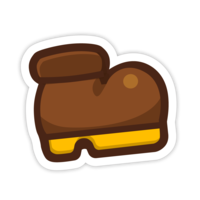
- Main article: Sticker
Stickers are the primary items in Paper Mario: Sticker Star. They serve as the only method of attack within battles, items to solve puzzles, and the like. Stickers can be found anywhere in levels, being stuck across the environment and inside blocks, and can also be purchased in shops. Any stickers collected are stored in the album.
Types of stickers
There are many types of stickers, but the two main types are Jump stickers and Hammer stickers. Jump stickers include Jump, Hopslipper, Line Jump, and Iron Jump. Most Jump stickers can attack all enemies that are not spiked or have some other hazard on top of them. Hammer stickers include Hammer, Eekhammer, Slaphammer, and Hurlhammer. Most of them can hit all enemies except ones that have wings, Spear Guys when holding their spear horizontally, or have some type of flying device, such as Kamek's broom.
Other types of attack stickers include Fire Flower and Ice Flower stickers that burn and freeze enemies, respectively. Certain enemies also occasionally drop stickers that represent their weapons - for example, Sombrero Guys occasionally drop Sombrero stickers, and Bob-ombs drop Bomb stickers.
There are also stickers that support Mario in battle, such as Spike Helmets that give Mario a helmet that damages all enemies that attack him from above. Also in this category are Mushrooms that heal Mario and Leaf stickers that execute all action commands perfectly for one turn.
There are Secret Door stickers that Mario is able to paste onto the environment via the paperize ability. These doors reveal secret underground rooms containing rare stickers and/or Things that are usually not used for storyline purposes, such as the Thumbtack and the Squirt Gun. In addition, using one in battle allows Mario to always run away from the fight.
There are two special stickers that appear exclusively in battle. Kamek turns all of Mario's stickers into sandal stickers during the Kamek battles in World 2-2 and 6-3. Sandal stickers are similar to Eekhammers as they strike multiple times in a hammer-like fashion. Sandal stickers also retain their power status, i.e. a Shiny Jump sticker turns into a Shiny Sandal and a Megaflash Slaphammer turns into a Megaflash Sandal.
The second sticker of this kind is Kersti, who enters Mario's sticker book during the final phase of Bowser's battle. She activates the Battle Spinner and automatically gives Mario five slots for stickers per turn. Even though Kersti disappears from the sticker book once used, Mario wishes her to be alive again, so he can still Paperize and talk to Kersti after the battle.
Although neither sticker can be tossed or sold in shops, selling Kersti is mentioned twice in the game: entering Decalburg's shop for the first time, and right before Kersti enters Mario's sticker book when battling Bowser. Also, if Mario is able to defeat Bowser without using the Kersti sticker, he is able to toss Kersti away. However, this action does not alter the storyline.
Sticker traits
Sometimes, stickers have special traits applied to them, such as "Shiny", "Flashy", and "Big". These stickers usually sparkle in Mario's album and do more damage to enemies. Stickers that have traits like "Big" and "Megaflash" take up more space in the album. Typically, stickers wielding special traits are rarer than normal stickers. Battle Stickers and Thing Stickers come in three sizes: small (1x1), medium (1.5x1.5), and large (2x2). The Big 1UP sticker is the only regular sticker with the Big quality. The Secret Door sticker, despite the name, is both Big and Shiny.
| Normal sticker | Worn-out sticker | Shiny sticker | Flashy sticker | Big sticker | Big Shiny sticker | Megaflash sticker |
|---|---|---|---|---|---|---|
 |
 |
 |
 |
 |
 |
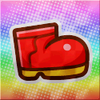
|
Things
Throughout the world are real-life objects called Things which Mario can collect. He can bring them to a Sling-a-Thing location and convert them into a usable sticker. Things are required to make progress or to make a boss fight significantly easier. Most Things share its ability with two other Things, each with a different level of strength and size in the album. These Things are interchangeable in puzzles which require a certain ability. Mario can only carry one of each Thing in his inventory, either in its normal form or as a sticker.
Scraps
Scraps are key items that function similarly to stickers. They are usually needed to progress through levels. Unlike stickers, scraps come from the environment directly and leave a purple void when they are peeled away using the paperization ability. Scraps that need to be peeled off the environment first are usually orientated incorrectly. Some scraps must be found in levels before they can be put back into position. While the space a scrap fills in is still empty, Mario cannot interact with that space.
Characters
Protagonists
| Character | Description |
|---|---|
 Mario |
The one and only playable character in the game. In addition to his jumping abilities, he is able to use his hammer as well as a new paperize ability exclusive to this game, with the help of Kersti. Throughout his adventure, Mario must collect a number of stickers to store in his album. These stickers are essential for battles as well as for solving certain puzzles. |
 Kersti |
Mario's permanent partner over the course of his journey, a fairy from the Sticker Star who grants Mario the abilities of paperization and Battle Spin. She occasionally becomes separated from Mario and is shown to have both a soft side as well as a temperamental personality. Mario may also ask her for advice, often providing commentary on the nearby scenery or a suggestion as to where to go or what to do next. |
Allies
| Character | Description |
|---|---|
 Princess Peach |
The princess of the Mushroom Kingdom who presides over the Sticker Fest. Once the Sticker Comet breaks and a Royal Sticker lands on Bowser's head, she is kidnapped by him and taken to Bowser's Sky Castle. |
Luigi |
Mario's brother that appears in the background. Mario can paperize and pull him from the background, causing him to walk offscreen. Pulling him out of the background all five times makes him lead the Victory parade rather than a green Toad. |
Birdo |
Birdo makes a brief appearance in Snow Rise. She sings Soul Rumblings to Mario and gives him the Goat Thing. |
 Wiggler/Flutter |
A childish Wiggler that Mario first finds at Leaflitter Path. He later gets separated into segments by Kamek. Once reassembled, he helps Mario reach the island at Whitecap Beach. He later ages into a Flutter and flies Mario and Kersti towards Bowser Jr.'s Flotilla. |
Toads
| Character | Description |
|---|---|
Troublesome Toad |
A red Toad who gives Mario a beneficial item every time they run into each other. He is recognizable from the crease on his head. |
Crybaby Toad |
A green Toad found bawling in the enclosed garden of Hither Thither Hill. Mario may escort him back to his house in Decalburg to receive a Mushroom and a hint toward the code he must enter inside the windmill. |
Traveling Toad |
A red Toad who gets ambushed by enemies in each world. Mario can either bribe the enemies with coins or battle them to save the Toad. Each time he is saved, he sends a postcard to his "bud". |
Shady Toad |
A red Toad who sells previously collected Things to Mario. He is found to the left of the Sling-a-Thing stand in Decalburg. |
Sling-a-Thing Toad |
A purple Toad that runs the Sling-a-Thing in Decalburg. |
Swindler Toad |
A Toad who Mario frees from Bowser Tape during the prologue. He later attempts to sell Mario supposed rare stickers for a high price. |
 Oasis Toad |
A red Toad that attempts to brave a sandstorm to find the hidden oasis. Once Mario clears it using the Vacuum, he is devastated seeing the dried up oasis. When Mario uses the Faucet to refill the oasis, the Toad allows access to the nearby building. |
Steward |
A purple Toad who inherited the Enigmansion from the forebear. After Mario takes the lift at Whiteout Valley, he gives ownership of the mansion back to the forebear and becomes his servant. |
Forebear |
A sepia tone Toad who formerly owned the Enigmansion. Initially, he is found on the Forebear's Portrait scrap. Once Mario uses it at Whiteout Valley, he comes to life and operates the ski lift. If Mario returns to the Enigmansion after this point, it is seen that he has regained ownership of the mansion. |
Sticker Museum curator |
A green Toad initially trapped under the Decalburg fountain after the town gets unrolled. Mario can paperize to rescue him, allowing access to the Sticker Museum. |
Followers
These allies temporarily join Mario's party and follow him around until they are taken to a certain location, where they perform an action or advance the storyline. In the Wiggler Segment's case, they must tire out before they join Mario and go back to Wiggler's Tree House.
- A stack of Toads
- Wiggler Segments
Antagonists
| Character | Description |
|---|---|
 Bowser |
The primary antagonist of the game. He invades Decalburg during Sticker Fest and attempts to take the Sticker Comet, only to break it into six Royal Stickers. The strongest of the Royal Stickers lands on his head, ampliying his power greatly. |
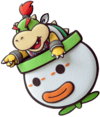 Bowser Jr. |
Bowser's son who makes his Paper Mario series debut in this game. He wishes to collect rare stickers and attacks using his Junior Clown Car. |
 Kamek |
A Magikoopa who also makes his Paper Mario debut in this game. Kamek interferes with Mario the most out of all the villains. He attempts to halt Mario's progress by either by causing a problem Mario must solve or fighting Mario directly. |
Enemies
- Main article: Paper Mario: Sticker Star bestiary
Regular enemies
Bosses
These are the bosses, sorted in order. Highlighted rows signify main bosses.
| Name | HP | Attack | Defense | Location |
|---|---|---|---|---|
 Bowser Jr. (first time) |
20 | 3 | 0 | Warm Fuzzy Plains |
 Kamek (first time) |
20 | 4 | 0 | Water's Edge Way |
 Big Buzzy Beetle (optional) |
40 | 3 | 999 (0 when flipped over) (vulnerable to Thing stickers) | Hither Thither Hill |
Megasparkle Goomba |
90 | 5 | Halves all damage (except for Things) | Goomba Fortress |
 Kamek (second time) |
20 | 6 | 0 | Yoshi Sphinx |
 Tower Power Pokey |
300 | 7 | Quarters all damage (except for Things) | Drybake Stadium |
 Wiggler Segment |
15 | 5 | 0 | The Bafflewood, Loop Loop River, Tree Branch Trail, Whitecap Beach |
Big Scuttlebug |
16 | 8 | 0 | Rustle Burrow |
 Gooper Blooper |
300 | 7 | Quarters all damage (except for Things) | Whitecap Beach |
 Big Cheep Cheep |
88 | 4 | 0 | Surfshine Harbor |
 Big Boo |
100 | 10 | 0 | The Enigmansion |
 Bowser Jr. (second time) |
100 | 3 | 1 | Decal Channel |
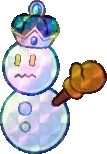 Bowser Snow Statue/Mizzter Blizzard |
400/100 | 10 | Quarters all damage (except for fire or Things) | Bowser's Snow Fort |
 Big Chain Chomp |
99 | 10 | 999 | Chomp Ruins, Rumble Volcano |
 Petey Piranha |
300 | 4 | Quarters all damage (except for Things) | Rumble Volcano |
 Bowser Jr. (final time) |
300 | 6 | 2 | Bowser Jr.'s Flotilla |
 Kamek (final time) |
20 | 6 | 0 | Bowser's Sky Castle |
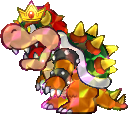 Bowser |
400/500 | 10 | Halves all damage (except for Things) / All damage is reduced to 1 | Bowser's Sky Castle |
Boss helpers
These enemies appear only during Bowser's boss fight and assist him during different phases.
| Name | HP | Attack | Defense | Location |
|---|---|---|---|---|
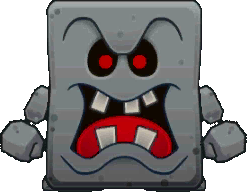 Whomp |
50 | 10 | All damage is reduced to 1 (except for Things) | Bowser's Sky Castle |
Lava Bubble |
N/A | 2 | 0 | Bowser's Sky Castle |
 Chain Chomp |
100 | 10 | ∞ | Bowser's Sky Castle |
Obstacles
Alongside regular enemies, there are enemies who act as obstacles. They cannot be directly battled, but can usually be defeated with the hammer or a stomp.
| Name | Description |
|---|---|
Lakitu |
An enemy that appears only in Whammino Mountain and tosses Spinies. It is difficult to reach Lakitu with Mario and cannot be battled, although it can be defeated with a Super Star. |
 Flowing Sand |
Obstacles in World 2 that slows Mario's movement and hinders his jumps. If Mario stays in it for too long, it causes a Game Over. |
Spikes |
Obstacles found primarily in Sandshifter Ruins that damage and knock back Mario if he touches them. |
 Poisoned Water |
A substance found throughout World 3 before Mario defeats Gooper Blooper. If Mario touches it in the overworld, he takes damage. If Mario initiates a battle in poison, he takes damage from it every turn. |
 Co Gasagoso |
Miniature Scuttlebugs that only appear in Rustle Burrow. They chase Mario and slow him if they reach him. They can be defeated with a hammer or stomp. |
 Cooligan |
Large penguins which damage Mario if he walks into them. They either slide or waddle, with the sliding variety able to be defeated with a stomp. |
 Fishbone |
Skeletal Cheep Cheeps that leap out of the river and attempt to eat away at Mario's raft at Jungle Rapids. Mario must hit them with his hammer to stop them. |
 Cheep Chomp |
A giant relative of Cheep Cheeps that attempts to ram into Mario's raft at Long Fall Falls. Letting it destroy all the segments of the raft or being directly in front of it as it charges causes an instant Game Over. |
 Bomp |
Obstacles found only in the Chomp Ruins that protrude from waterfalls and walls. |
 Volcanic debris |
Chunks of rock that appear only in Rugged Road. They home in on Mario and have a lingering effect, but also fall slowly. |
 Lava |
Molten rock found in World 5. If Mario touches it, he takes three points of damage and is launched back to the nearest solid ground. Some geysers of lava also appear. |
 Bill Blaster |
Cannons that only appear on Bowser Jr.'s Flotilla. They shoot out Bullet Bills and cannot be battled. |
Bullet Bill |
Large bullets that deal two points of damage to Mario if they come into contact. They can be defeated with the hammer or a stomp. |
 Banzai Bill |
Larger versions of Bullet Bills also found on Bowser Jr's Flotilla. If Mario touches one, it does 30 points of damage. |
Locations
Unlike previous installments, the game's locations function much like a level progression system. Each level course is unlocked after collecting a Comet Piece in the preceding area. The map is reminiscent of the one used in Super Mario RPG: Legend of the Seven Stars, though it is more open-ended and not linear. Players are not required to finish the levels and worlds in numerical order. Many levels contain alternate exits that lead to other levels, and the goal of entering a level is not always to "finish" it by touching the Comet Pieces.
| Image | Level | Description | Things found | Connects to | |
|---|---|---|---|---|---|
| Main World | |||||
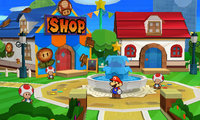
|
Decalburg | The only town within the game. After Bowser breaks the Sticker Comet, Mario must help the Toads to unroll the main plaza. Many services are found here, including a sticker shop, the Sticker Museum, and a Sling-a-Thing. | None | Warm Fuzzy Plains Drybake Desert Leaflitter Path Surfshine Harbor | |

|
Surfshine Harbor | A harbor with nearby warehouses. To gain access to the rest of the worlds, Mario must help a Toad who has problems with his ship and defeat a Big Cheep Cheep in the harbor's waters. | Vacuum | Decalburg Snow Rise Shy Guy Jungle Gate Cliff | |
| World 1 | |||||
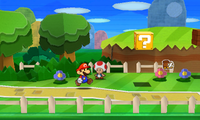
|
1-1: Warm Fuzzy Plains | A typical grassland area. Mario first learns of Things, Scraps, paperization, and Comet Pieces during this level. Bowser Jr. is first fought here. | Scissors Thumbtack |
Decalburg Bouquet Gardens | |
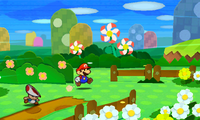
|
1-2: Bouquet Gardens | A region filled with flowers. To progress, Mario has to collect the Fan to stop its breeze. He can also restore a Toad's flower garden by sticking flower stickers and rescue the traveling Toad. Near the end, he is ambushed by five Goombas, prompting Kersti to introduce the Battle Spinner. | Fan Cat-o-Luck |
Warm Fuzzy Plains Water's Edge Way | |
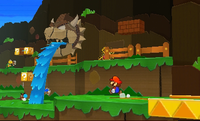
|
1-3: Water's Edge Way* | A level with waterfalls and rivers. Kamek battles Mario uses his magic to turn the Comet Piece into a Scrap, forcing him to search for it. Along the way, Mario stops a cardboard Bowser from pumping water. | Faucet Bed |
Bouquet Gardens Hither Thither Hill Whammino Mountain | |
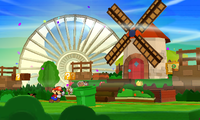
|
1-4: Hither Thither Hill | An area with a significant underground portion. Mario must use the Fan to gain access inside the windmill. Before he can collect the Comet Piece, Mario has to battle a Big Buzzy Beetle. | Matches | Water's Edge Way Goomba Fortress | |
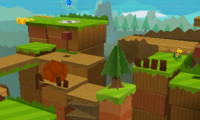
|
1-5: Whammino Mountain | A mountainous area which has a sticker shop. Mario can cause a chain reaction which reveals a trapped Toad and allows him to get the White Gate Scrap. | Bellows | Water's Edge Way Goomba Fortress | |
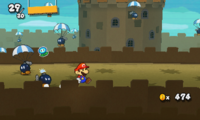
|
1-6: Goomba Fortress | A fortress which barrages Mario with Bob-ombs, wind vents, and turning floors. At the top of a tower, he battles the Megasparkle Goomba. | Trumpet Squirt Gun |
Hither Thither Hill Whammino Mountain | |
| World 2 | |||||
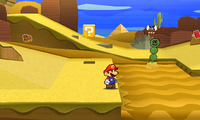
|
2-1: Drybake Desert | The beginning of the desert blocked by closed doors. To open them, Mario must use stickers. At the end of the level is a pyramid-like structure which Mario must climb to reach the Comet Piece. | Soda Car Battery |
Yoshi Sphinx Damp Oasis | |
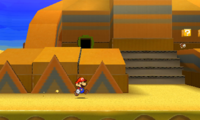
|
2-2: Yoshi Sphinx | A giant structure which Mario must scale to the top of. He battles a group of Koopa Paratroopas and Kamek near the top. | Lightbulb Paper Fan |
Drybake Desert Damp Oasis | |
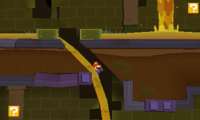
|
2-3: Sandshifter Ruins | An underground cave made up of flowing sand slides and rooms filled caskets. Mario can open the caskets, revealing nothing, items, or Dry Bones. | Bat Jackhammer Magnifying Glass Lighter |
Damp Oasis Drybake Stadium | |
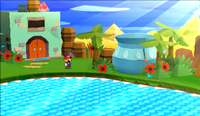
|
2-4: Damp Oasis | A portion of the desert ravaged by a sandstorm. To restore the area, Mario must use Things to stop the sandstorm and refill the oasis with water. | Shaved Ice Hair Shears |
Drybake Desert Sandshifter Ruins | |
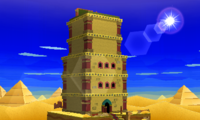
|
2-5: Drybake Stadium | A large tower which must be reassembled first by finding its scraps. At the top, Mario battles Tower Power Pokey. | None | Sandshifter Ruins | |
| World 3 | |||||
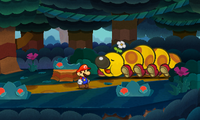
|
3-1: Leaflitter Path | The start of the forest region initially blocked by a giant Wiggler. After Mario ventures deeper into the forest, he encounters bodies of poisoned water and gets attacked by two Boomerang Bros. | Searchlight | Decalburg The Bafflewood | |
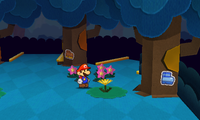
|
3-2: The Bafflewood | Similar to Forever Forest, the Bafflewood acts like a maze that brings Mario to the beginning if he goes down an incorrect path. He later must find a Wiggler Segment here. | Bowling Ball Trophy Violin |
Leaflitter Path Wiggler's Tree House Loop Loop River Tree Branch Trail | |
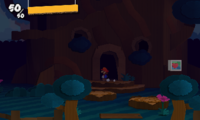
|
3-3: Wiggler's Tree House** | A tall tree which serves as Wiggler's home. When Mario first arrives, he only finds Wiggler's head. Wiggler tells Mario how Kamek separated him into segments. Mario must return all of the segments to Wiggler to fix him. | High Heel Boom Box |
The Bafflewood Strike Lake Rustle Burrow Gauntlet Pond | |
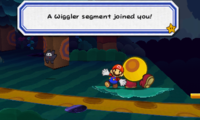
|
3-4: Strike Lake* | When Mario first arrives, he has to chase down one of Wiggler's segments. He must return later with the Bowling Ball Thing to open an alternate exit. | Billiard Ball Bowling Ball Drum |
Wiggler's Tree House Loop Loop River Holey Thicket | |
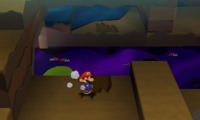
|
3-5: Loop Loop River* | An area of the forest which has an isolated, circular river. After getting the Wiggler Segment from Strike Lake, it runs here and battles Mario. | Pillow | The Bafflewood Strike Lake Outlook Point | |
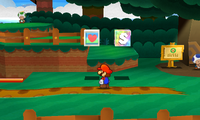
|
3-6: Outlook Point | A location on the edge of the forest which contains a sticker shop and a Sling-a-Thing. Before Mario beats Gooper Blooper, poison can be seen emanating from a shipwreck in the distance. | Fishhook | Loop Loop River | |
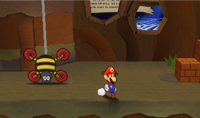
|
3-7: Rustle Burrow | A primarily underground level which mainly features Scuttlebugs. The first time Mario enters the level, he falls down a giant hole, losing his stickers, hammer, and Kersti. He must retrieve them as well as the Wiggler Segment. | Upright Vacuum | Wiggler's Tree House Tree Branch Trail Stump Glade | |
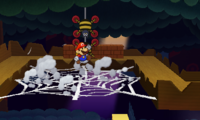
|
3-8: Tree Branch Trail | An area mostly made up of hollowed tree trunks and paths connecting them. After getting the Wiggler Segment in Rustle Burrow, it runs here. | Watch Battery Tape |
The Bafflewood Rustle Burrow | |
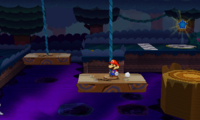
|
3-9: Gauntlet Pond | A level characterized by its swinging log platforms and large bodies of poisoned water. Another Wiggler segment is found here. | Sponge | Wiggler's Tree House Stump Glade Holey Thicket | |
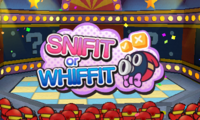
|
3-10: Stump Glade | After the Wiggler Segment from Gauntlet Pond runs here, it becomes the prize in Snifit or Whiffit. Mario must win the game show to win the segment back. | Radiator Square Can |
Rustle Burrow Gauntlet Pond | |
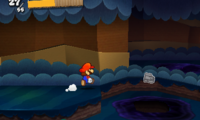
|
3-11: Holey Thicket* | A region of the forest that features Bowser Tape and holes covered by poison. Mario must uncover the Poison Bloopers that hold a Wiggler Segment. | Balloon | Strike Lake Gauntlet Pond Whitecap Beach | |
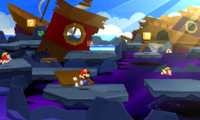
|
3-12: Whitecap Beach | A beach which leads to a shipwreck in the distance. In the shipwreck is Gooper Blooper, the world's boss. Mario must first reassemble Wiggler before he can progress. | Pocket Watch Newspaper |
Holey Thicket | |
| World 4 | |||||
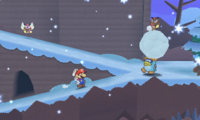
|
4-1: Snow Rise* | A level filled with many snowy inclines. Mario must melt the snow where Cooligans slide. Birdo can give her performance of "Swinging Swing" as well. | Goat Cell Phone |
Surfshine Harbor Whiteout Valley Shy Guy Jungle Gate Cliff | |
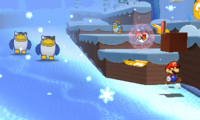
|
4-2: Ice Flow | A region primarily made of frozen rivers and icy caves. Cooligans waddle down the frozen rivers. | Curling Stone Cat-o-Luck Rubber Ducky Hair Dryer |
Snow Rise The Enigmansion | |
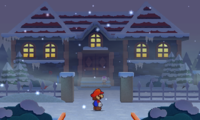
|
4-3: The Enigmansion | A mansion within a snowstorm. Mario must seal 100 Boos back into the Book of Sealing and fight a Big Boo when Kamek interferes. | Watering Can Oven Refrigerator Stapler Cake |
Ice Flow Shaved-Ice Cave | |
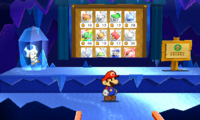
|
4-4: Shaved-Ice Cave | A level which only serves as a sticker shop. Its owner is frozen in ice. | None | The Enigmansion | |
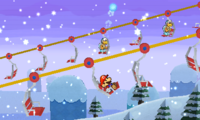
|
4-5: Whiteout Valley | A segment where Mario rides a chair lift up a mountain. During the ride, Mario must jump to attack Fuzzies and avoid ice balls from Ice Bros. | Flashlight | Snow Rise Bowser's Snow Fort | |
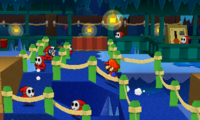
|
4-6: Bowser's Snow Fort | An area where Mario rides a mine cart. Along the way, he must restore parts of the track by paperizing and pasting scraps. At the end, he fights the Bowser Snow Statue. | Sewing Scissors | Whiteout Valley | |
| World 5 | |||||
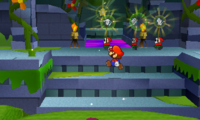
|
5-1: Shy Guy Jungle | The beginning of a jungle that leads to some ruins. Mario must defeat three Spear Guys to obtain their portion of a bridge and finish the level. | Toy Bat Powder Puff Tailor Shears |
Surfshine Harbor Snow Rise Jungle Rapids Long Fall Falls Gate Cliff | |
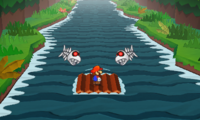
|
5-2: Jungle Rapids | A level where Mario rides a raft down a river. During the ride, he must tilt it and ward off Fish Bones to prevent it from getting damaged. | Rubber Ducky Mini Vacuum |
Shy Guy Jungle Long Fall Falls | |
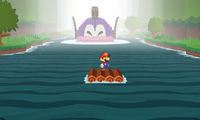
|
5-3: Long Fall Falls* | A continuation to Jungle Rapids where Mario has to evade a giant Cheep Chomp. | Luxurious Bed | Shy Guy Jungle Jungle Rapids Chomp Ruins | |
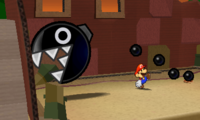
|
5-4: Chomp Ruins | Ruins filled with Bomps and rotating saws. At the top is a sleeping Big Chain Chomp whose stake must be hammered down to reveal the Comet Piece. | Teapot D-Cell Battery Air Conditioner |
Long Fall Falls Rugged Road | |
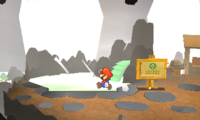
|
5-5: Rugged Road | The base of the world's volcano filled with lava and volcanic debris. Mario must freeze the first area to progress. It also features an underground hot spring. | Car Sponge Turkey Basin |
Chomp Ruins Rumble Volcano | |
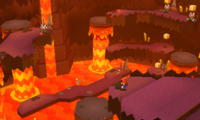
|
5-6: Rumble Volcano | A large volcano at the end of this world. When Mario first enters, Kersti gets taken by Petey Piranha. Mario must navigate to Petey by letting Big Chain Chomps fall onto a platform raised by magma. | Guitar | Rugged Road | |
| World 6 | |||||
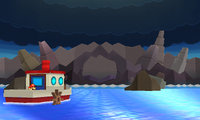
|
6-1: Gate Cliff | Cliff faces which appears to be a dead end. Once Mario returns with five Royal Stickers, they cause five dots to appear on the cliff. This allows him to paperize and uncover Bowser's castle which then rises into the air. | None | Surfshine Harbor Snow Rise Shy Guy Jungle Bowser Jr.'s Flotilla | |
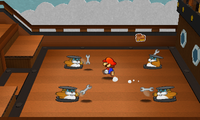
|
6-2: Bowser Jr.'s Flotilla | Bowser Jr.'s airship. In order to reach it, Mario must receive help from Flutter. Mario must navigate the airship and battle Bowser Jr. for the last time to collect the final Comet Piece. | None | Gate Cliff Bowser's Sky Castle | |
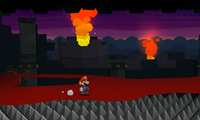
|
6-3: Bowser's Sky Castle | The final level of the game. Mario battles Kamek for the final time. After crossing a large bed of spikes, Mario begins his fight with Bowser. | None | Bowser Jr.'s Flotilla | |
(*) = Level with an alternate exit.
(**) = Level with two alternate exits.
Services
Sticker shops
- Main article: List of shops in Paper Mario: Sticker Star
Throughout the world are shops run by blue Toads that sell stickers. Some shops have exclusive stickers that cannot be found elsewhere like the Secret Door at Outlook Point. Unlike previous games, stickers have the same buying and selling prices at all of the shops. As Mario collects the Royal Stickers, new and stronger stickers become stocked at previously visited shops.
Sling-a-Thing
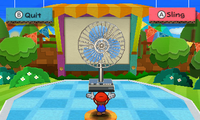
At Sling-a-Thing, Mario can convert Things into stickers for free. It first becomes available after obtaining the Cat-o-Luck at Bouquet Gardens. In order to convert a Thing, he must have space in the album. There are two Sling-a-Thing locations. One is found to the left of Decalburg's plaza and the other is at Outlook Point behind the shop.
Shady Toad
Located to the left of the Sling-a-Thing in Decalburg is a Toad who sells Mario Things he has already collected but does not currently have in his inventory.
Newspaper
Within the blue-roofed house on the east side of Decalburg is a newspaper which Mario can read. It details Luigi's hiding spots throughout the world. After the player finds him, the newspaper updates.
Additional activities
Sticker Museum
If Mario frees the Sticker Museum curator from under the Decalburg fountain, he is allowed to enter the Sticker Museum. Initially, it is empty, but Mario can fill it with both regular stickers and Thing stickers. If Mario has a sticker in his album which is not in the museum, a door lights up that indicates its location. Once a sticker is placed into the museum, additional information about the sticker is added. By placing all of the regular stickers in the museum, the enemy gallery is unlocked. Doing so with the Thing stickers unlocks the music gallery.
Hidden Luigi
Within five levels, the player can spot Luigi in the background. By paperizing, the player can pull Luigi out, causing him to look around and jump offscreen. Finding him all five times causes him to lead the parade during the credits. He is found in the following levels:
- W1-6: Goomba Fortress - At the end of the bridge to the tower, Luigi sits on the fortress' wall.
- W2-5: Drybake Stadium - At the outdoor section of the fourth floor, Luigi appears in a window on the right.
- W3-12: Whitecap Beach - At the end of the broken pier, Luigi sits on a rock in the distance.
- W4-5: Whiteout Valley - Near the top of the ski lift, Luigi sits on one of the chairs going down.
- W5-5: Rugged Road - After the area with the Save Block, there is a section with volcanic debris. Letting the debris make a hole in floor reveals an underground section. In there, Luigi appears in one of the hot springs.
Super Flags
There are a total of eight achievements that the player can earn in this game, all of which can be achieved at any time by completing the corresponding task. After completing Goomba Fortress and getting the first Royal Sticker, eight Super Flags are placed in the Sticker Fest area of Decalburg. These can be examined to view the player's progress in unlocking the achievements. A completed achievement displays its corresponding flag, and any completed Super Flags appear unrolled in the game's credits.
| Achievement | How to Obtain |
|---|---|
| Heartthrob | Collect all HP-Up Hearts. |
| Honorary Curator | Collect every single sticker type. |
| Covert Doorman | Find and open all Secret doors. |
| Comet Repairman | Collect all Comet Pieces. |
| Super Shopper | Spend 10,000 coins in Toad shops only. |
| Speed Star | Get a Perfect Bonus (finish the battle in one turn while not taking any damage in battle) in 500 battles or more. |
| Mr. Excellent | Perform 1,000 "Excellent!" action commands in battle. |
| Spin Doctor | Get three symbols matched on the Battle Spinner 50 times. |
Wiggler's Diary
In Wiggler's Tree House, there is a diary on the third floor. Initially, the diary is completely blank. Once Kamek separates Wiggler into segments, Mario can bring the Wiggler Segments to certain locations to create entries in the diary. There are five entries in total, with four of them being optional. After Wiggler is reassembled, any remaining blank pages cannot be filled in.
Nintendo eShop description
- NA Version
- When an accident scatters stickers across the land, Mario™ sets off on an adventure to repair a torn world. Searching Forests, Deserts and Mountains, Mario collects stickers to solve puzzles and battle monsters. In a first for the series, there are no experience points, so finding power-ups to improve Mario's abilities is more important than ever. Mixing sticker-based gameplay elements with the traditional action-battle system of the Paper Mario™ series delivers a new twist on a classic franchise. Flatten-out characters, roll out towns, and walk through living, breathing dioramas in a brand-new Paper Mario adventure on the Nintendo 3DS™ system!
- EU Version
- Paper Mario is back, and finds himself in another sticky situation! Take Mario on an exciting paper adventure and help him repair the mess Bowser has created using the powers of brand new stickers. A cast of colourful characters will keep you laughing along the way as the familiar world of Paper Mario is brought to life in Paper Mario: Sticker Star for Nintendo 3DS! The visually stunning 3D effects make it seem as though you're looking into and exploring a world made up of shoebox dioramas!
Similarities to other Paper Mario games
- Turn-based battles return, functioning similarly to Paper Mario and Paper Mario: The Thousand-Year Door.
- Bowser once again becomes invincible with one of the game's key objects, much like the first game.
- The first chapter takes place in a grassland, and once again contains a boss that is fought in a castle/fortress-like setting.
- The second chapter takes place within a desert, as with the first game.
- The third chapter contains a darkened forest area, much like Forever Forest in Paper Mario.
- Additionally, The Bafflewood contains similar maze/puzzle elements.
- A giant Blooper is fought in this game, as with the previous three installments.
- The fourth chapter contains a multitude of Shy Guys, as with the first installment.
- The fifth world takes place within a tropical locale, just like Paper Mario and Paper Mario: The Thousand-Year Door.
- This world also has a cave and volcanic setting, much like the previous games.
- A plant-themed boss is fought in this world/chapter, as with the first game and Super Paper Mario.
- A parade takes place during the ending and Luigi can lead it, just like the first Paper Mario.
- Similar to the original game, there is no post-game content (though a Purple Toad appears on the festival grounds)
- Therefore, the final boss can be fought again.
- A story epilogue occurs after each chapter is completed.
- Adding onto the above, all four installments contain rhyming dialogue in some way, shape, or form.
- The way Petey Piranha captures Kersti is similar to how Francis kidnaps Tippi in Super Paper Mario.
- Bowser is the main antagonist like in Paper Mario.
Differences from other Paper Mario games
- This is the first Paper Mario title released for a handheld console.
- Paper Mario: Sticker Star is the first Paper Mario game to not start at the Mario Bros.' House, nor feature this place at all.
- Unlike the first two Paper Mario games, Paper Mario: Sticker Star does not have Flower Points, Star Points, Experience Points, Badges, or Items. Mario also has no partners to battle by his side (although Kersti gives him access to the Battle Spinner).
- This is the first game in the Paper Mario series where Lady Bow and Parakarry do not make an appearance in any form (although Parakarry is mentioned on a paper in Shy Guy Jungle).
- Only coins are awarded after battles.
- All the bosses in Paper Mario: Sticker Star are not unique to the Paper Mario series, as they are all more powerful versions of preexisting enemies or bosses featured in other Super Mario games. Similarly, the game does not feature any new enemies, only enemies from other Super Mario games and new variants of them.
- Kamek takes on the role filled by Kammy Koopa in the first two Paper Mario games.
- This is the first Paper Mario game where the player cannot make text scroll faster or reread past conversations.
- This is the only Paper Mario game where Bowser and Luigi have no lines of dialogue.
- The world map is now used to get to other locations, unlike the other installments, and like in Super Mario RPG: Legend of the Seven Stars.
- Unlike Paper Mario: The Thousand-Year Door and Super Paper Mario, the game does not feature an Audience.
- This is the first Paper Mario game that is not split into separate chapters, instead opting to use worlds, like Super Mario RPG: Legend of the Seven Stars. If it were, there would only be 6 chapters, whereas the first three installments all possessed 8 chapters.
- Unlike Paper Mario: The Thousand-Year Door and Super Paper Mario, Mario does not have any voice clips recorded by Charles Martinet in Paper Mario: Sticker Star.
- Paper Mario: Sticker Star does not have an optional boss with higher stats than the final boss.
- This is the first Paper Mario game not to include enemy Tattles.
- Consequently, several aspects of it have been incorporated into regular battle. For example, an HP bar showing the collective health of all enemies on screen displays during battle. The enemies' names are also all displayed while Mario is choosing stickers, similar to the Mario & Luigi series.
- This is the first Paper Mario game without cooking/recipes.
- This is the first game where no Koopa Troopas wear sunglasses.
- This is the first in the series to have only one playable character.
- Moreover, it is the first one to not feature Peach as a playable character.
- It is the first Paper Mario where Mario cannot turn into an 8-bit version of himself.
- Mario cannot choose which enemy to attack if there are multiple ones; he defaults to the one in front.
- Unlike the first 3 installments, Mario starts his journey with 20 HP, as opposed to 10.
- When Mario's current HP is at most 30% of its total, the in-battle music (except for the final battle with Bowser) changes to a "tired" arrangement of itself, replacing the alarm sound heard in the other Paper Mario games while being in critical health conditions.
- Unlike the first 3 installments, Paper Mario: Sticker Star only has 3 save files instead of 4.
- Save files also cannot be named unlike the past installments.
- The game does not feature an opening story before the title screen as the other Paper Mario games; the opening story is instead shown when starting a new game.
- This is the first Paper Mario installment since the original Nintendo 64 installment to lack a fully playable epilogue; though the game does save after being beaten, it is only to add a Toad on the Sticker Fest grounds that replays the credits.
- This is the first game in the Paper Mario series to have the maximum number of coins be 9,999 instead of 999.
- The game is also the first to feature a pop-up bubble to show what pressing
does, instead of an exclamation point or just the button to press.
Staff
- Main article: List of Paper Mario: Sticker Star staff
The game was developed by Intelligent Systems, Nintendo SPD Group No.3, and Vanpool, Inc. This game is the first time Vanpool worked on a Paper Mario game and the second Super Mario role-playing game the company developed following its work on Mario & Luigi: Superstar Saga's minigames. It was directed by Naohiko Aoyama and produced by Kensuke Tanabe and Toshiyuki Nakamura. Taro Kudo of Vanpool, Inc. was in charge of the direction and script. His first involvement on a Super Mario game was Super Mario RPG: Legend of the Seven Stars as a staff member of Square.[1] Shingo Igata served as the lead map designer and Shiho Iwabuchi designed the user interface. Satoru Iwata served as executive producer.
Development
In a 2007 interview with Nintendo Power magazine, when asked about the future of the Paper Mario series, Super Paper Mario director Ryota Kawade stated that he was uncertain whether the next game would follow Super Paper Mario's gameplay style, return to the style of the previous games, or be based around a new concept. However, he also stated that the team "always feel that we want a challenge and to take on new things."[2] Producer Kensuke Tanabe also stated, "I don't think we'll ever go back to the exact same game style as before," and that, "I also would like to look for another new and different style."[2]
Paper Mario: Sticker Star started development at the end of 2009.[1] The development team thought Paper Mario was a good fit for the Nintendo 3DS and initially developed it as a RPG making use of the system's stereoscopic 3D display capabilities. After showcasing a build of the game at E3 2010, a demo of this build was previewed by Shigeru Miyamoto, who was reportedly unimpressed, dismissing it as "just a port of the GC version", and requested that the team "make a big change" to make it stand out.[1] Said development team was mostly composed of developers new to Paper Mario (planning and design staff being "about 90%" new, according to Kenji Nakajima), with a few veterans brought in to help with the usage of old assets.[1] Naohiko Aoyama, who conceived the original Paper Mario's visual direction but had little involvement with its sequels, was brought in as the director.
Following Miyamoto's impression, the development team brainstormed ideas to make the game stand out. It was eventually decided to expand the sticker mechanic, which had initially been designed for use in puzzles, and expand it to the rest of the game.[1] As the sticker system expanded, the development team decided to abandon the partner system and traditional RPG elements such as an experience point system, with progression instead being outlined by the player getting progressively stronger stickers. However, when another prototype was shown in spring 2011, Miyamoto was not happy with it, considering its gameplay boring, and the developers introduced Things.[1]
Early in development, Miyamoto also encouraged the developers to keep the story to a minimum[3] and only use pre-established Super Mario characters. The decision to not focus on the storyline was also influenced by results gathered from Super Paper Mario's Club Nintendo survey, which had less than 1% of the respondents citing its plotline as a strong point.[1] Producer Kensuke Tanabe also asked the team to focus on the "paper" aspect of the visuals.
Reception
Critical response
Paper Mario: Sticker Star received generally positive reviews from critics, gaining an average of 75.97% based on forty-nine reviews on GameRankings and 75 based on sixty-nine reviews on Metacritic.[4][5] Compared to previous iterations of the Paper Mario series, its aggregate score is weaker, due to critics mainly complaining about what has been seen as frustrating game design due to the limitations of the sticker-based combat system, the unbalanced difficulty of boss battles and excessive backtracking due to the Things mechanic, and the toned-down story, gameplay and characters. On Metacritic, there is a large discrepancy between the average user score and the critic score, scoring an average of 5.5 on the user score, with many users criticizing the overall new direction of the Paper Mario series. Across critics and users, it is considered the weakest game in the series.
Cam Shea of IGN gave the game an 8.3, praising what he opined as a fresh take on the Paper Mario series with charming design and a sense of humor, but he criticized the sticker system, as well as some design elements he found frustrating. He wrote, "In spite of all my criticisms, [Paper Mario:] Sticker Star is still compelling to play and a great deal of fun. The game's infectious spirit and sense of humour is irresistible, and it's big, too – you're not beating this one in a weekend. It's just a shame that putting stickers at the heart of the game didn't turn out to be the master-stroke it so readily could have been. Paper Mario fans will enjoy [Paper Mario:] Sticker Star, but ultimately it's just as notable for its failures as its successes."[6] Edge Magazine UK gave the game an 8, praising Intelligent Systems's effort to shape its RPG for portable play.[7] Destructoid gave the game an 8/10 and praised the game for what was opined as an impressive effort, but warned that the game may disappoint previous Paper Mario fans.[8] Mike Wehner of The Escapist gave the game 4.5 stars out of 5, praising the game for its artistic style and its gameplay, while criticizing puzzles seen as frustrating. He wrote as the bottom line, "There's just no getting around it: Paper Mario: Sticker Star is yet another high-quality entry into Nintendo's cherished library of first party titles. The experience is high on satisfaction and low on frustration, making it an undeniably perfect fit for the company's mobile console. It's not entirely flawless, but as Mario games go, it's one of the best."[9]
JC Fletcher of Joystick gave the game 3.5 out of 5 stars. He praised an opined easygoing and funny nature of the game, but criticized the game design (seen as frustrating), saying that the existence of FAQs will improve the game, due to sacrificing turn-based battles with what has been opined as awkward platforming.[10] Carolyn Petit of GameSpot gave the game a 7.5 out of 10. She believed the game to have smart and witty writing, good puzzles, and overall charm, but criticized the frustration of getting stuck and the combat system. She ended with, "[Paper Mario:] Sticker Star falls into a rut at times and may even drive you crazy, but in the end, Paper Mario's unwaveringly cheerful attitude, and fond memories of the game's many great moments, will be what stays with you.".[11]
However, André Segers of GameXplain was more critical of the game, giving it a score of two stars out of five.[12] He criticized the story as "one of the biggest and most unfortunate changes" and the puzzles, by saying that "the things you need [to solve them] could be found anywhere" and "the game provides no clues on where to find them". He also said that the battle system is "fresh and fun at first" but then started criticizing it, saying that there is "no sense of accomplishment after winning a battle", and ultimately referring to the combat as a "chore". However, Segers did praise the game for "trying some new things" and for its "flashes of typical Paper Mario brilliance".[12]
David Jenkins of Metro UK held a similar view on the game, giving it a score of 4 out of 10.[13] He criticized the game's selection of characters, labeling Kersti as an "unlikeable nag", and contrasted the game's progression unfavorably with the immersion and character selection of previous Paper Mario games. Other points of criticism included an opined lack of meaningful rewards from battles and the amount of backtracking. While Jenkins praised the game's visuals and fine-tuning for a portable system, he ultimately labeled the game as "a horrible disappointment that not only fails to capture the magic of its predecessors but seems oblivious to what made them popular in the first place", recommending Mario & Luigi: Bowser's Inside Story in its place.
Ray Carsillo of EGM gave a mixed review of the game, giving it a score of 6.5 out of 10.[14] He asserted that the game "maintains all the charm and personality of those that came before it" and praised the aesthetics, 3D effects, and alternate routes. However, he criticized the battle system due to a perceived over-reliance on sticker collection, along with the amount of backtracking involved.
The four Famitsu critics gave a very positive reception, giving it 36/40 points, calling it a "well-made RPG" and praising the sticker system as "unique".[15]
| Reviews | |||
|---|---|---|---|
| Release | Reviewer, Publication | Score | Comment |
| Nintendo 3DS | Cam Shea, IGN | 8.3/10 | "In spite of all my criticisms, Sticker Star is still compelling to play and a great deal of fun. The game's infectious spirit and sense of humour is irresistible, and it's big, too – you're not beating this one in a weekend. It's just a shame that putting stickers at the heart of the game didn't turn out to be the master-stroke it so readily could have been. Paper Mario fans will enjoy Sticker Star, but ultimately it's just as notable for its failures as its successes." |
| Nintendo 3DS | Rich Stanton, Eurogamer | 7/10 | "Sticker Star has two sides. One is a world that's a simple, vibrant joy to be in. The other is a set of systems so pared back that they waver between easy and tedious, matched up to a badly signposted set of puzzles. There's just enough adventure and charm to mitigate the latter, but that's the shame of it; Sticker Star squeaks a pass when it could, and should, be spectacular." |
| Nintendo 3DS | Carolyn Petit, GameSpot | 7.5/10 | "Thankfully, making your way through stages is otherwise enjoyable. This isn't a platformer, but there's enough leaping on swinging platforms and avoiding deadly hazards to give Sticker Star's gameplay a pleasant Mario feel. Nods to memorable stages from early Mario games pop up from time to time, and the quest keeps you on your toes by throwing you into a number of unexpected situations. Mario finds himself in one fix after another, and before all is said and done, you'll have completed all sorts of death-defying feats, like riding a raft down a treacherous river, busting some ghosts, and even competing on a game show. Sticker Star falls into a rut at times and may even drive you crazy, but in the end, Paper Mario's unwaveringly cheerful attitude, and fond memories of the game's many great moments, will be what stays with you." |
| Aggregators | |||
| Compiler | Platform / Score | ||
| Metacritic | 75 | ||
| GameRankings | 75.97% | ||
Sales
As of March 31, 2014, Paper Mario: Sticker Star has sold about 2.21 million copies worldwide.[16] In Europe, the game sold enough copies to be reprinted under the Nintendo Selects label line.
Promotion
At New York Comic Con in 2012, a wall consisting of 493 segments was present. Throughout the event, attendees were given stickers corresponding to a number on the wall. After 43 hours, the mosaic was completed and revealed an advertisement for Paper Mario: Sticker Star.[17] In addition, large stickers of Mario, a Toad stuck to Bowser Tape, the Megasparkle Goomba, Bowser Jr., and a sticker that read "I WAS STICKER BOMBED!" were attached to the backs and bags of New York Comic Con attendees.[18] To promote the game's release, a contest was held challenging entrants to create a Paper Mario-themed diorama.[19] It ran from October 29, 2012 through November 7, 2012. In the contest announcement video, production company Iam8bit created a sample diorama. Winners of the contest received a Nintendo 3DS XL, a copy of Paper Mario: Sticker Star, a 100 USD gift card for the Nintendo eShop, a paper-craft trophy created by Iam8bit, and a chance for the winner's diorama to be displayed at Nintendo World. On November 14, 2012, 18 contestant-submitted videos were uploaded to Nintendo's official YouTube channel.[20] From its release for download onto the Nintendo eShop until January 6, 2013, Club Nintendo members in North America who downloaded Paper Mario: Sticker Star and registered it on Club Nintendo also received Donkey Kong: Original Edition for free.[21]
Quotes
- Main article: List of Paper Mario: Sticker Star quotes
- "You come over here, you fling a thing, and HEY PRESTO! It becomes a sticker. I call it a "thing sticker" because I'm a bit of a marketing genius." – Sling-a-Thing Toad
- "Thanks to you, Wiggler's segments saw many things in many places." – Wiggler
- "Pretty grandiose fortress for a bunch of little minions... Overcompensate much?" – Kersti
- "And I got stomped on every time! Makes me terrified just reliving it! I never want to be a doormat again!" – Toad
- "OK, kiddos, go play whatever you want outside! You know, tag or hide-and-seek or kick-the-Goomba or something." – Kamek
Glitches
- Main article: List of Paper Mario: Sticker Star glitches
Falling through the stage
In Yoshi Sphinx, if the player hits a Koopa Paratroopa and a wall at the same time, the wall pushes Mario through the floor and gives the player a Game Over when the battle is over.
No album sounds
If the player collects a sticker and opens the album immediately after, the sound effects for the album cannot be heard, except for the ones that play when a page is flipped and after organizing stickers. This can be ended by returning to normal gameplay.
Pre-release and unused content
Originally, Bowser's Sky Castle was meant to have minigames, but due to development time restraints they were cut. In the E3 2010 demo, Goombas, Koopas, and Pokeys used their designs established in Paper Mario: The Thousand-Year Door. It also showed a Chain Chomp partner as well as a Monty Mole boss, though both were removed from the final game.
Within the game are graphics for unused enemies like a spiked variant of the Green Pokey and Ptooie and hurt graphics for Fish Bone and Lakitu who only serve as obstacles in the final game. Several scraps go unused that were supposed to be used in World 1 as they match the world's visual theming. In addition, there are unused rooms which includes early versions of the Sticker Fest celebration grounds, the residential area of Decalburg, the main area of the Sticker Museum, and the warehouse section of Surfshine Harbor. The early versions of the celebration grounds include an additional exit on the left side.
Regional differences
- The Korean and Chinese versions changed the color of the Paper Fan from red to blue and removed the kanji symbol.
- The windmill code at Hither Thither Hill is 7942 in the Korean version, 9958 in the Chinese version, and 4123 in all other versions.
- The European English, Spanish, and French script modifies some of the names of Things and the Sticky Wiki Entries in the Sticker Museum, such as the Paper Fan and Cell Phone, known as the Mobile Phone in European English. In addition, the European release of the game adds descriptions for Things while they are a sticker in the album.
- In the Japanese, Korean, and Chinese versions of Paper Mario: Sticker Star, the symbols used for the true-or-false challenges in Snifit or Whiffit are different. The "correct answer" block is blue with a circle symbol, rather than green with a check mark.
Gallery
- For this subject's image gallery, see Gallery:Paper Mario: Sticker Star.
A crumpled Goomba
Media
- For a complete list of media for this subject, see List of Paper Mario: Sticker Star media. For this subject's sound test, see Sticker Museum § Music gallery.
| File info 0:30 |
| File info 0:30 |
| File info 0:30 |
| File info 0:30 |
| File info 0:30 |
References to other games
- Super Mario Bros.: Part of the overworld theme can be heard in the Warm Fuzzy Plains theme (along with a jazz arrangement of said theme that plays when Gooper Blooper is poisoned during his fight), as well as in the game's credits. Also, a baseball-styled rendition of the "Course Clear" theme from this game can be heard when Mario uses a battering Thing sticker.
- Super Mario Bros. 2: Pokeys based on their appearance in this game appear. The main theme is a jazzy version of the credits theme with snippets of the main overworld theme.
- Super Mario Bros. 3: The Goomba's Shoe, Super Leaf, and Frog Suit return directly from this game, now as stickers. An Airship also appears. The athletic overworld theme is re-arranged for the ski lift ride in 4-5. Also, the King's theme is used for the cutscene following a Royal Sticker boss battle. When the Snifit host explains the rules to Snifit or Whiffit, a cover of the Spade Panel plays.
- Super Mario World: Portions of the music inside the Enigmansion, along with the music played when talking to the owner while he waits outside, are an arrangement of the Ghost House theme. In addition, Bowser Jr.'s final moments in the game mirror the post-level screen for Ludwig's castle.
- Super Mario Land 2: 6 Golden Coins: The music played when using the Boom Box is a snippet of the Space Zone theme from this game.
- Super Mario World 2: Yoshi's Island: During the very final battle phase with Bowser, a portion of the music that plays is based on the Superstar Mario theme from this game.
- Super Mario RPG: Legend of the Seven Stars: The beginning of Paper Mario: Sticker Star has a cosmic object being shattered into pieces, and the main character has to retrieve the pieces of the object, similar to this game. In addition, the main bad guys are implied to have left at least one of the pieces to be guarded by a monster, similar to Smithy's Gang. When walking down the hallway in Bowser's Sky Castle, the camera is in an angled position that is similar to the camera position in this game. Lastly, during the final battle, Bowser uses a Chain Chomp as a weapon, much like he did in Super Mario RPG. Also, the parade in the end credits is similar to the one from this game.
- Super Mario 64: During the mine cart ride in World 4-6, an arrangement of Slider plays.
- Paper Mario: Similar to the first Paper Mario, Bowser ends up becoming nigh-invincible from a magical wish-granting object. In this case, however, it is purely by accident. Also, in both games' climax, Mario confronts Bowser at a flying castle, and Bowser also ends up growing larger in a last-ditch effort to beat Mario after his initial invincibility is temporarily disabled, also significantly bolstering his invincibility to be absolute. The game ends with a parade, much like this game. Enemies like Spear Guys and Ninjis make their re-appearance in the series since this game. Also, a letter written by Parakarry may be found in Shy Guy Jungle in the garbage before Mario uses the Vacuum or Goat Thing. Mario's design and expressions are more based on him in this game, as well as the scenery. If the worlds in Paper Mario: Sticker Star are completed in numerical order, the boss of the fifth "chapter", as in Paper Mario, is a Piranha Plant fought inside a volcano. Additionally, a slight cover of the Dry Dry Ruins theme (combined with the Super Mario Bros. Underground Theme) can be heard in the cavern of World 2-1.
- Mario Kart: Super Circuit: The Yoshi Sphinx in this game is similar to the one found in the background of Yoshi Desert.
- Super Mario Sunshine: Bowser Jr., Gooper Blooper and Petey Piranha, who make their first and main appearances in this game, return. Also, one of the Snifit or Whiffit questions claims that Princess Peach is Bowser Jr.'s mother, possibly referencing the story of Super Mario Sunshine.
- Paper Mario: The Thousand-Year Door: Searching the dump in Shy Guy Jungle before using the Goat or the Vacuum reveals a memo from Goombella, who is apparently still attending University of Goom and doing research on the Chomp Ruins during the events of the game, but is never seen. The miniboss theme is a cover of this game's. Mario's expression when first seeing a Boo is the same as Doopliss' when his name is guessed. Also, the outline of this game's logo is used in the "Paper Mario" part of the Sticker Star logo.
- Super Paper Mario:
- At the beginning of the game, after Mario saves one of the Toads in Decalburg, the latter says that Bowser crumpled him up 256 times, which is a nod to the running joke in Super Paper Mario, starting with Dimentio claiming that Dimension D makes his attacks "256 times more powerful", followed by Flint Cragley's camera crew stating that the "Rainbowzilla" story was apparently told that amount of times. This number is also the number of cards in the game.
- When a Paper-Cone Goomba, 2-Fold Goomba, 5-Fold Paragoomba, or Shiny-Cone Goomba is about to fold up, it uses a similar dashed rectangular outline to enemies that can Flip.
- Super Mario Galaxy: Portions of the music inside the Enigmansion are lifted from the Ghostly Galaxy theme. The way of getting a Royal Sticker resembles the one when getting a Power Star.
- New Super Mario Bros. Wii: Some of the enemies, such as Ice Bros. and Scaredy Rats that appeared in this game return in this game. Most of the enemies and the general themes of the worlds are also designed from their appearances from this game. The Big Buzzy Beetle is an unused enemy in New Super Mario Bros. Wii.
- Super Mario 3D Land: The Poison Mushroom has the same design as in this game. Also, one part of the title screen music sounds like the beginning of Special 2-1's music from this game. Some of the designs, such as the trees in World 7, are reused in this game.
References in later games
- New Super Mario Bros. U: The Big Buzzy Beetle who debuts in Paper Mario: Sticker Star reappears as a species in New Super Mario Bros. U, although it was an unused enemy in New Super Mario Bros. Wii. Also, Bony Beetle has the same design as in this game and Bowser Jr. uses the same glass dome in his Junior Clown Car.
- Mario & Luigi: Dream Team: The Snifit or Whiffit quiz show has the same ✔ and ✘ blocks as to the ✔ and ✘ panels in the Check-X Quiz in this game.
- Super Smash Bros. for Nintendo 3DS: Hither Thither Hill and Bowser's Sky Castle appear as a variations of the Paper Mario stage in this game. The Fan Thing also appears in the background of the stage variation.
- Mario & Luigi: Paper Jam: Many of the bosses and enemies return in this game. In addition, Tower Power Pokey retains his Royal Sticker from this game.
- Paper Mario: Color Splash: Many of this game's elements return, such as the different types of stickers originated there (Hopslipper, Line Jump, Iron Jump, Eekhammer, Hurlhammer, Tail, Frog Suit, Spike Helmet, etc.), Thing objects, Birdo singing in a performance, and Snifit or Whiffit.
- Super Smash Bros. Ultimate: The Paper Mario stage returns.
- Paper Mario: The Origami King: Shiny and flashy attacks return from this game. In addition, Peach appears in a photo, surrounded by stickers. Additionally, the fan that blows the fog away in Bonehead Island, the Scissors boss and the basin used in the Trial of Courage resemble their respective Things in the game. The music of the main boss introductions is incorporated into the music of the Vellumental's introductions. Kersti is mentioned in one of the easy statements in the Trial of Wisdom.
Names in other languages
| Language | Name | Meaning | Notes |
|---|---|---|---|
| Japanese | ペーパーマリオ スーパーシール[?] Pēpā Mario Sūpā Shīru |
Paper Mario: Super Seal | |
| Chinese (simplified) | 纸片马力欧 超级贴纸[?] Zhǐpiàn Mǎlìōu Chāojí Tiēzhǐ |
Paper Mario: Super Sticker | |
| Chinese (traditional) | 紙片瑪利歐 超級貼紙[?] Zhǐpiàn Mǎlìōu Chāojí Tiēzhǐ |
Paper Mario: Super Sticker | |
| French | Paper Mario: Sticker Star[?] | - | |
| Italian | Paper Mario: Sticker Star[?] | - | |
| Korean | 페이퍼 마리오 스티커 스타[?] Peipeo Mario Stikeo Seuta |
Paper Mario Sticker Star | |
| Spanish | Paper Mario: Sticker Star[?] | - |
Trivia
- The e-manual says Mario can be defeated by falling, though this is impossible without glitches.
- Similarly, Kersti says that if Mario touches the spikes in the rolling carpet section of Bowser's Sky Castle then he will be "done for", although they only take away one HP and send Mario back to the beginning of the area if he falls off the rolling carpet.
- Despite using the new font introduced in Super Mario 3D Land for the logo, the game uses the old font used in games prior to 3D Land.
- The Prima Strategy Guide mentions various enemies that don't appear in the game, such as 4-Fold Goombas and Shiny Dry Bones.
References
- ^ a b c d e f g Iwata Asks: Paper Mario Sticker Star. Nintendo of America (American English). Retrieved July 2, 2024.
- ^ a b Williams, Drew (May 2007). "Super Paper Mario: The Interview" - Nintendo Power Issue 215. Page 76–78.
- ^ Nintendo Life staff. (November 13, 2012). Interview: The Team Behind Paper Mario: Sticker Star. Nintendo Life.
- ^ Paper Mario: Sticker Star. GameRankings. Archived November 9, 2012, 01:47:19 UTC from the original via Wayback Machine. Retrieved July 2, 2024.
- ^ Paper Mario: Sticker Star. Metacritic. Retrieved July 2, 2024.
- ^ Shea, Cam (November 6, 2012). Paper Mario: Sticker Star Review. IGN. Retrieved July 2, 2024.
- ^ November 22, 2012. Paper Mario: Sticker Star review. EDGE Online. Archived November 28, 2012, 00:10:08 UTC from the original via Wayback Machine. Retrieved July 2, 2024.
- ^ Holmes, Jonathan (November 6, 2012). Review: Paper Mario: Sticker Star. Destructoid. Retrieved July 2, 2024.
- ^ Wehner, Mike (November 21, 2012). Paper Mario: Sticker Star Review. Escapist Magazine (English). Archived January 23, 2013, 02:12:06 UTC from the original via Wayback Machine. Retrieved July 2, 2024.
- ^ Fletcher, JC. Paper Mario Sticker Star review: Looks good on paper. Joystiq (English). Archived November 14, 2012, 05:06:32 UTC from the original via Wayback Machine. Retrieved July 2, 2024.
- ^ Petit, Carolyn (November 9, 2012). Paper Mario: Sticker Star Review. GameSpot (English). Retrieved July 2, 2024.
- ^ a b GameXplain (November 6, 2012). Paper Mario: Sticker Star - Video Review (Nintendo 3DS) [HD]. YouTube (American English). Retrieved July 2, 2024.
- ^ Jenkins, David (December 5, 2012). Paper Mario: Sticker Star review – not a peeling. Metro (British English). Retrieved July 2, 2024.
- ^ Carsillo, Ray (November 6, 2012). EGM Review: Paper Mario: Sticker Star. EGMNOW (English). Archived November 10, 2012, 09:50:42 UTC from the original via Wayback Machine. Retrieved July 2, 2024.
- ^ Gifford, Kevin (November 28, 2012). Japan Review Check: Yakuza 5, Paper Mario 3DS. Polygon (English). Retrieved July 2, 2024.
- ^ IR Information : Sales Data - Top Selling Software Units - Nintendo 3DS Software. Nintendo (English). Archived August 18, 2014, 04:46:17 UTC from the original via Wayback Machine. Retrieved July 2, 2024.
- ^ Nintendo of America (November 5, 2012). Nintendo 3DS - Paper Mario: Sticker Star Mosaic. YouTube (American English). Retrieved September 13, 2021.
- ^ Nintendo of America (November 5, 2012). Nintendo 3DS - Paper Mario: Sticker Star Sticker Bombing. YouTube (American English). Retrieved September 13, 2021.
- ^ Nintendo of America (October 30, 2012). Diorama Contest "How To" Video. YouTube (American English). Retrieved September 13, 2021.
- ^ Nintendo of America (November 14, 2012). Paper Mario: Sticker Star Diorama Contest. YouTube (American English). Retrieved September 13, 2021.
- ^ England, Kyle (October 1, 2012). Nightly News Roundup: 10.01.2012. Nintendojo. Retrieved July 2, 2024.
External links
- Websites
- Official Japanese website
- Official American English website
- Official British English website
- Official Taiwanese website
- Manuals
